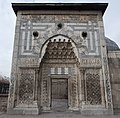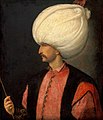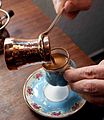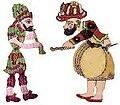Merhaba! Türkiye portalına hoş geldiniz. Hi! Welcome to the Turkey portal.
 | |
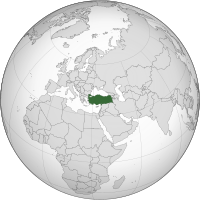
| |
Turkey, officially the Republic of Türkiye, is a country mainly located in Anatolia in West Asia, with a smaller part called East Thrace in Southeast Europe. It borders the Black Sea to the north; Georgia, Armenia, Azerbaijan, and Iran to the east; Iraq, Syria, and the Mediterranean Sea to the south; and the Aegean Sea, Greece, and Bulgaria to the west. Turkey is home to over 85 million people; most are ethnic Turks, while ethnic Kurds are the largest ethnic minority. Officially a secular state, Turkey has a Muslim-majority population. Ankara is Turkey's capital and second-largest city, while Istanbul is its largest city and economic and financial center. Other major cities include İzmir, Bursa, and Antalya.
Turkey was first inhabited by modern humans during the Late Paleolithic. Home to important Neolithic sites like Göbekli Tepe and some of the earliest farming areas, present-day Turkey was inhabited by various ancient peoples. The Hattians were assimilated by the Anatolian peoples, such as the Hittites. Classical Anatolia transitioned into cultural Hellenization following the conquests of Alexander the Great; Hellenization continued during the Roman and Byzantine eras. The Seljuk Turks began migrating into Anatolia in the 11th century, starting the Turkification process. The Seljuk Sultanate of Rum ruled Anatolia until the Mongol invasion in 1243, when it disintegrated into Turkish principalities. Beginning in 1299, the Ottomans united the principalities and expanded; Mehmed II conquered Istanbul in 1453. During the reigns of Selim I and Suleiman the Magnificent, the Ottoman Empire became a global power. From 1789 onwards, the empire saw a major transformation, reforms, and centralization while its territory declined.
In the 19th and early 20th centuries, persecution of Muslims during the Ottoman contraction and in the Russian Empire resulted in large-scale loss of life and mass migration into modern-day Turkey from the Balkans, Caucasus, and Crimea. Under the control of the Three Pashas, the Ottoman Empire entered World War I in 1914, during which the Ottoman government committed genocides against its Armenian, Greek, and Assyrian subjects. Following Ottoman defeat, the Turkish War of Independence resulted in the abolition of the sultanate and the signing of the Treaty of Lausanne. The Republic was proclaimed on 29 October 1923, modelled on the reforms initiated by the country's first president, Mustafa Kemal Atatürk. Turkey remained neutral during most of World War II, but was involved in the Korean War. Several military interventions interfered with the transition to a multi-party system.
Turkey is an upper-middle-income and emerging country; its economy is the world's 17th-largest by nominal and 12th-largest by PPP-adjusted GDP. It is a unitary presidential republic. Turkey is a founding member of the OECD, G20, and Organization of Turkic States. With a geopolitically significant location, Turkey is a regional power and an early member of NATO. An EU candidate, Turkey is part of the EU Customs Union, CoE, OIC, and TURKSOY.
Turkey has coastal plains, a high central plateau, and various mountain ranges; its climate is temperate with harsher conditions in the interior. Home to three biodiversity hotspots, Turkey is prone to frequent earthquakes and is highly vulnerable to climate change. Turkey has a universal healthcare system, growing access to education, and increasing levels of innovativeness. It is a leading TV content exporter. With 21 UNESCO World Heritage sites, 30 UNESCO intangible cultural heritage inscriptions, and a rich and diverse cuisine, Turkey is the fifth most visited country in the world. (Full article...)
Selected article -

Atatürk Airport (IATA: ISL, ICAO: LTBA) is an airport currently in use for private jets. It used to be the primary international airport of Istanbul and the hub of Turkish Airlines until it was closed to commercial passenger flights on 6 April 2019. From that point, all passenger flights were transferred to the new Istanbul Airport. (Full article...)
General images
Did you know -
- ... that when Turkey gave out personal identification numbers to their citizens in 2000, they chose to number all 120 million people born since 1840, living or dead? (November 11, 2009) Wikipedia:Recent additions 250
- ... that the mosque of Hirami Ahmet Pasha

- ... that Krikor Apikoğlu founded Apikoğlu, the first company to mass produce meat products in Turkey? (March 9, 2013)
- ... that female karateka Yıldız Aras holds more World, European, and Mediterranean Games champion titles than any other Turkish sportsperson? (November 8, 2009) Wikipedia:Recent additions 250
- ... that 14th-century Turkish polymath Al-Taftazani completed one of his best-known works at the age of 16? (December 22, 2008) Wikipedia:Recent additions 237
- ... that the crown in the coat of arms of Amsterdam is the Imperial Crown of Austria?
- ... that ten days before the ratification of the Peace of Szeged, Vladislaus, King of Hungary, swore an oath which invalidated it and all future treaties with the Ottoman Empire? (May 25, 2007) Wikipedia:Recent additions 143
Selected picture
Selected biography -

Nureddin Ibrahim Pasha (Turkish: Nurettin Paşa, Nureddin İbrahim Paşa; 1873 – 18 February 1932), known as Nureddin İbrahim Konyar from 1934, was a Turkish military officer who served in the Ottoman Army during World War I and in the Turkish Army during the Western Front of the Turkish War of Independence. He was called Bearded Nureddin (Turkish: Sakallı Nurettin) because being the only high-ranking Turkish officer during the Turkish War of Independence sporting a beard. He is known as one of the most important commanders of the war. He ordered several murders and massacres. (Full article...)
Selected video -
Selected quote -
| “ | Today the Soviet Union is a friend and an ally. We need this friendship. However, no one can know what will happen tomorrow. Just like the Ottoman and Austro-Hungarian Empires it may tear itself apart or shrink in size. The people that it holds so tightly in its grip may one day slip away. The world may see a new balance of power. It is then that Turkey must know what to do. Ally Soviets have under their control our brothers with whom we share language, beliefs and roots. We must be prepared to embrace them. Being ready does not mean that we will sit quietly and wait. We must get ready. How does a people get prepared for such an endeavour? By strengthening the natural bridges that exist between us. Language is a bridge... Religion is a bridge... History is a bridge... We must delve into our roots and reconstruct what history has divided. We can't wait for them to approach us. We must reach out to them. | ” |
Recognized content
Provinces
Related portals
Religions in Turkey
Neighbouring countries
Countries with related heritage
WikiProjects
Turkish wikipedia
 |
There is a Turkish version of Wikipedia, the free encyclopedia. |
Wikimedia
The following Wikimedia Foundation sister projects provide more on this subject:
-
Commons
Free media repository -
Wikibooks
Free textbooks and manuals -
Wikidata
Free knowledge base -
Wikinews
Free-content news -
Wikiquote
Collection of quotations -
Wikisource
Free-content library -
Wikiversity
Free learning tools -
Wikivoyage
Free travel guide -
Wiktionary
Dictionary and thesaurus












